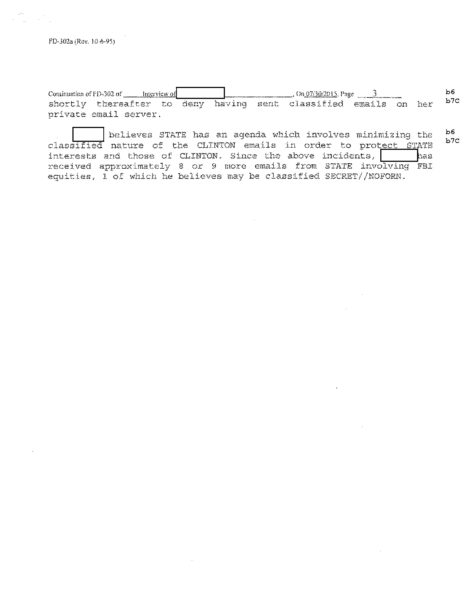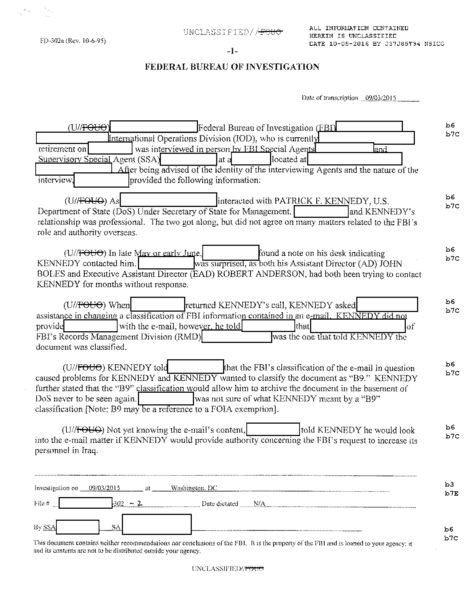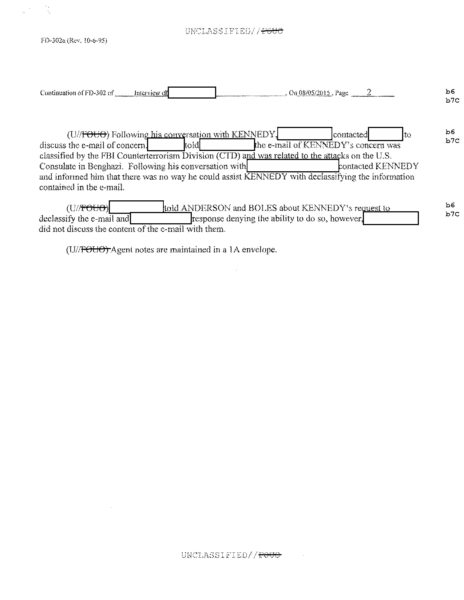Today the FBI released another 100 pages relating to its investigation of Hillary Clinton’s conduct as Secretary of State. Why it has taken so long for the agency to review, redact and publish a very small quantity of documents is inexplicable. Be that as it may, the documents released today are explosive.
You may have seen headlines to the effect that Hillary’s State Department tried to pressure the FBI to say that various documents located on Hillary’s insecure home server were not classified. This was critical, obviously, because one of Hillary’s lines of defense was to claim, falsely, that she never sent or received classified documents on her off-the-books email system.
Those headlines are correct, but to get the full impact you really have to see the relevant portions of the FBI investigation. Here they are; in all cases, click to enlarge. But first, a description.
In the first page, an unidentified FBI employee says he was “pressured” to change the classification of an email to render it unclassified. This pressure came from someone within the FBI, who said he had been contacted by Undersecretary of State Patrick Kennedy, who “had asked his assistance in altering the email’s classification in exchange for a ‘quid pro quo.'” The quid pro quo was that, if the FBI would say the email was unclassified, the State Department would allow the FBI to “place more Agents in countries where they are presently forbidden.”
Subsequently, the interviewee was summoned to an “all agency” meeting at the State Department to discuss the classification review of the Hillary Clinton emails. This fact itself is astonishing: the meeting was attended by representatives of the State Department, the CIA, the Defense Intelligence Agency “and other government agencies,” including, obviously, the FBI. Patrick Kennedy presided. Someone asked whether any of the Hillary emails that were being reviewed for production were classified. Kennedy replied, “Well, we’ll see.”
Following the all agency meeting, Undersecretary of State Kennedy renewed his effort to pressure the FBI to change its classification of the document in question. The FBI representative wouldn’t budge, so Kennedy asked who else at the agency he could talk to. The interviewee gave the name of Michael Steinbach.
The interviewee then participated in a call with Kennedy and Steinbach, in which Kennedy “continued to pressure the FBI to change the classified markings on the email to unclassified.” Steinbach refused. What happened next is–deserves to be, anyway–a bombshell.
Prior to ending the conversation, KENNEDY asked whether the FBI or STATE would conduct the public statements on the matter. STEINBACH advised KENNEDY that the FBI would not comment publicly on the matter.
That was enough for the astonishingly corrupt Hillary Clinton. This is what happened next:
The conference call ended and, according to [ ], the Associated Press (AP) published the story within the hour. Former Secretary of State Clinton appeared in front of the press shortly thereafter to deny having sent classified emails on her private email server.
Here are the first two pages of the relevant FBI investigation file:
The next page of the FBI investigation report is a summary of an interview with someone at the agency–I assume the Mr. Steinbach already referred to. This person says that he got a phone call from Patrick Kennedy, which surprised him because he and another FBI official “had both been trying to contact KENNEDY for months without response.” What did Kennedy want? He “asked [ ] assistance in changing a classification of FBI information contained in an email.”
Kennedy explained that the classified email “caused problems,” and he wanted to categorize the document as a B9. The reference apparently is to a Freedom of Information Act exemption, but this is not clear. In any event, Kennedy said that such a classification would “allow him to archive the document in the basement of DoS [the State Department] never to be seen again.” Here is that page of the investigation report:
Finally, the last page of this part of the report quotes an FBI employee whose name is redacted, who contacted Patrick Kennedy to talk about the classification issue. Before talking to Kennedy, he learned that “the email of KENNEDY’s concern was classified by the FBI Counterterrorism Division (CTD) and was related to the attacks on the U.S. Consulate in Benghazi.” Having been told this, the FBI interviewee “contacted KENNEDY and informed him that there was no way he could assist KENNEDY with declassifying the information contained in the email.”
We have here a clear pattern of corruption that makes Watergate look like child’s play. Hillary’s aide, Patrick Kennedy, tried to bribe the FBI to change the classification of a Benghazi document so as to enable Hillary’s false claim that she didn’t send or receive classified information on her illegal home server. The FBI, to its credit, refused. (James Comey wasn’t involved at that stage.)
Hillary’s aide then asked whether the FBI would be saying anything publicly about the classification issue. Once assured that the FBI would be silent, Hillary took the stage and alleged publicly, and falsely, that she never used her illegal home server to send or receive classified information. One wonders, too, how many critically important documents have been “archive[d] … in the basement of DoS [the State Department] never to be seen again,” based on bogus FOIA exemptions.
Donald Trump has his faults, but Hillary Clinton is far too corrupt to serve as President of the United States.




Notice: All comments are subject to moderation. Our comments are intended to be a forum for civil discourse bearing on the subject under discussion. Commenters who stray beyond the bounds of civility or employ what we deem gratuitous vulgarity in a comment — including, but not limited to, “s***,” “f***,” “a*******,” or one of their many variants — will be banned without further notice in the sole discretion of the site moderator.